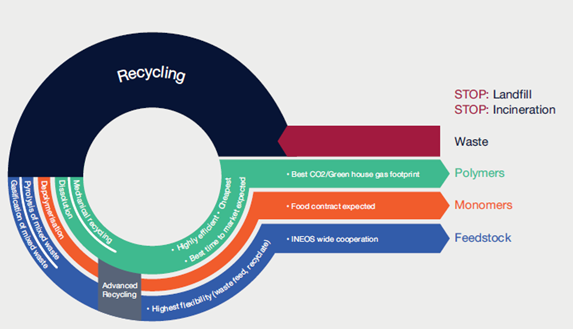Mechanical Recycling
In mechanical recycling, plastic waste is physically sorted, shredded, cleaned, and processed into smaller pieces without changing the basic structure of the material. This is then reprocessed back into products and is the quickest route to increasing recycling rates.
Across our businesses, we have already launched more than 25 new product grades that contain over 50% recycled content. Many of these are newly developed high-performance products that match the performance of virgin materials.
We have, for instance, developed new Recycl-IN polyolefin products containing up to 70% recycled polymer for a wide range of applications. Our INOVYN business has also fostered the VinylPlus industry recycling initiative that has enabled about 800’000 tonnes of PVC to be recycled each year.
One of the main bottlenecks in this approach is the economic collection and recovery of sufficient volumes of plastic waste of the right quality. To this end, INEOS is working with partners to help stimulate investment in recovery infrastructure in Europe.

ADVANCED RECYCLING
In advanced recycling, we distinguish between dissolution technology, depolymerisation, pyrolysis and gasification.
Dissolution technology
Waste polymers can be purified by dissolving them in a solvent and reducing or eliminating additives, colours, and impurities. The technology is still in the early stages of commercial development.
Depolymerisation
In depolymerisation, polymers are recovered and separated from consumer waste streams then unzipped back to the starting monomers from which they were made. These can then be purified and repolymerised to make high purity virgin resin. In a world first, INEOS Styrolution has proven the concept for polystyrene. It has demonstrated full circularity by depolymerising waste polystyrene back to styrene, then repolymerising it to make products identical to fossil carbon-based materials. We are now working with several partners to commercialise the process using state-of-the-art technologies.
Pyrolysis
Another approach is pyrolysis of mixed plastic waste, in which mixed plastic waste is converted to an oil via a thermal cracking process. This oil is further purified and processed, then used as feedstock in steam crackers to produce the building blocks (ethylene, propylene, butadiene, benzene) necessary for polymer and chemical production.
This recycling method is developing rapidly, and INEOS is at its forefront. The advantage is that it can process a wide range of post-consumer mixed plastic waste that could not otherwise be recycled and would end up in landfill or be burnt.
We have recently demonstrated the technology at commercial scale by feeding oils derived from mixed plastic waste to our large olefins unit in Cologne, Germany. The process and resulting products have been certified by the ISCC, an independent accreditation body. Also in 2021, INEOS O&P US received ISCC Plus certification across many of its sites including three sites in Texas and California following the successful commercial scale trials of advanced recycling production through pyrolysis.
Gasification
Mixed plastic wastes can also be converted by gasification to a synthesis gas which can then be further converted into polymers and other products. We are exploring this approach with academic and industry partners because it may provide a large scale, flexible, cost-effective way of reusing difficult-to-recycle mixed waste streams.
Gasification offers the highest flexibility and scalability in terms of waste, feed and recyclate.
However, it requires significant investment and development, for which joint industry collaboration will be needed.
These advances have been made by our multidisciplinary research teams, formed to bring material science, product design, and applications and process knowledge together for a common purpose.